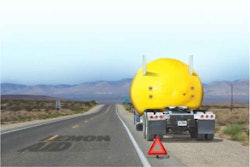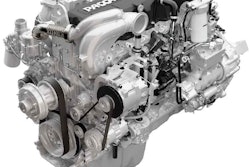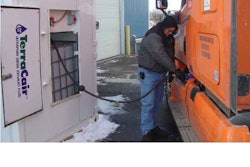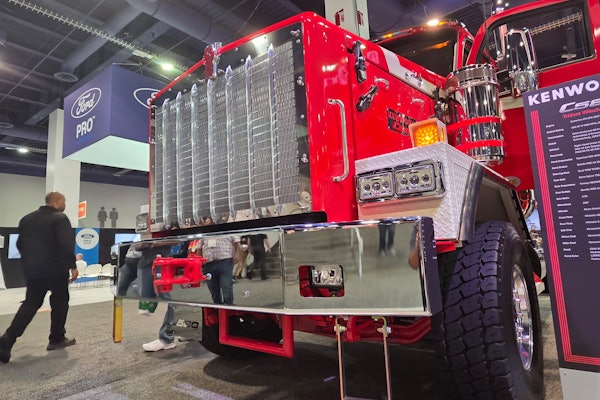
Only one state is known for strong protection against a chronically malfunctioning truck.
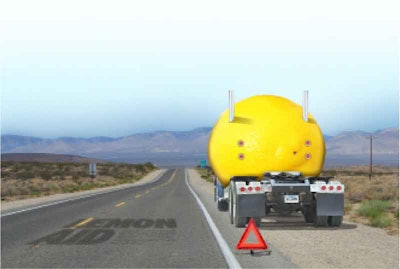
But soon after purchasing the truck new, he began to have problems with the suspension and other issues “they would work on, but they never really could get it all fixed.” The truck was in the shop about 100 days the first year.
Noll, living and having bought the truck in Wisconsin, was in a better position than most other operators who are saddled with a lemon. His wife, who worked with the Wisconsin bar association, looked up state law on warranties and lemon vehicles. They discovered that, though every state has a “lemon law” protecting new car buyers from defective vehicles, most laws have little to no application to commercial trucks.
Wisconsin’s law, however, is broad enough to apply also to Class 8 trucks, and appears to be the only such law that has resulted in a sizable number of successful lawsuits for new truck buyers. After a recent such case, questions have risen as to whether such laws ought to be more widespread.

“There’s not much to talk about in lemon law when it comes to trucks,” says Milwaukee area attorney Vince Megna, of Aiken & Scoptur, “except that there aren’t any, and the need for them. A lot of truck drivers call me, but for the ones that are out of state, there’s nothing that can be done.”
Megna handled the case of owner-operator Randy Seeman, who hauled sand and other commodities in dump trailers in the Midwest from his and his son’s Jewel Trucking in Janesville, Wis., until recently. The two work now as company drivers. In January, Seeman was awarded $290,000 when a jury found his 2007 model tractor to be a lemon.
A motor vehicle bought in Wisconsin is legally a lemon if it satisfies one of two conditions in the first year of ownership or while the vehicle is under the manufacturer’s warranty: 1) A defect remains after four unsuccessful repair attempts by the originating dealer or 2) The vehicle was out of service for 30 days or more during the warranty period due to defects. Under lemon law, the manufacturer of the truck – not the engine or transmission, for instance – is the liable party to whom claims are made.
The Seemans’ truck satisfied both conditions, the jury found. Under Wisconsin law, written to discourage manufacturers from taking lemon claims to court, automatic double damages apply in a successful plaintiff suit. In the Seemans’ case, Megna says the manufacturer turned down a settlement offer of $55,000, only to end up footing a much larger bill.
Attorneys’ fees, likewise, under Wisconsin law are shifted to the defendant. Noll speculates that’s one reason his case was settled, with Wisconsin attorney Lawrence Alan Towers representing him. After being decided in state court in favor of Noll, his case was initially appealed to a federal jurisdiction by the defendants, who “then thought better of their decision and offered me a settlement that was very advantageous toward me,” Noll says. Under the settlement, he agreed not to disclose its amount, but says, “It would have been cheaper for them to replace the truck.”
Towers says as manufacturers want to avoid the cost of lengthy litigation, and have seen attorneys’ success in prosecuting lemon claims in Wisconsin, many are quick to settle with owners to replace or repurchase the truck. Towers has lost only one such trial in the past 20 years. He estimates 98 percent of claims settled “gained the result we originally set out to get,” including a nearly $2.5 million settlement of a fleet case involving 32 trucks with identical problems.
That doesn’t mean manufacturers agree with how the law is written. Truck Manufacturers Association spokesman Joe Suchecki says the customer-manufacturer relationship in the heavy truck market differs from that in the automotive market. “We really don’t feel it’s appropriate to apply broad-based lemon laws without distinguishing between heavy, medium and light-duty vehicles,” he says.
In most cases, Suchecki says, truck “owners participate in the specification of the truck and there’s a lot of back and forth,” he says. “There’s a much bigger relationship between them and the manufacturers,” one reason lemon laws aren’t usually applied to commercial trucks.
Towers believes issues with emissions systems have in recent years made claims somewhat more frequent. He tells the story of a client whose 2008 model truck was replaced in February 2010 with a 2010 model, which was then repurchased in October after similar issues.
ATBS Maintenance Management Business Consultant Bill McClusky notes recent diesel technology advances make diagnosis and repair of complex truck systems more difficult. “We used to use the term mechanic,” he says of shop personnel. “But these trucks have changed dramatically over the years. It’s no longer a mechanical engine – there is so much in the way of electronics.”
Today’s diesel technician also has to be computer savvy and quick to learn, he adds. “You used to get two or three service bulletins a month on engines. Now it’s two or three a day.”
The growing complexity of truck systems, McClusky says, is further complicated by the limited resources available for training and paying technicians, as well as regulations that affect engine technology. He calls changes stemming from the California Air Resources Board and the U.S. Environmental Protection Agency emissions regulations as bringing about a “maintenance nightmare.”
Suchecki says TMA doesn’t monitor the frequency of lemon claims in Wisconsin or elsewhere, and doesn’t hear from its members about claims. But an apparent dearth of claims in states other than Wisconsin, he reasons, indicates that for most truck buyers, “these laws are probably more trouble than they’re worth – they make resolution of the issues more complicated than just dealing with the dealer.”
Having a lemon law for commercial trucks “opens the door to abuse,” says Mack Trucks spokesman John Walsh. “Instead of resorting to legal claims, we encourage our customers to work with their dealers regarding product concerns. That’s the most efficient and cost-effective approach.”
Other truck manufacturers declined to comment on lemon laws or did not respond to interview requests.
Megna estimates he’s handled 20 commercial truck cases in his decades of practice, and Towers says he’s filed “at least 100” truck cases since the early 1990s. Towers says other states’ exclusion of commercial trucks from lemon law protection seems to result from a faulty assumption that all business users have leverage against manufacturers to get problems dealt with satisfactorily.
Megna speculated the best way to get states to take notice would be for out-of-state owner-operators to buy in Wisconsin solely for the lemon law protection. “Say I live in Iowa but I went across the border and bought in Wisconsin,” says Megna. “If even a few owner-operators did that, it would create some concern in Iowa and a focus on the problem.” While one way to prove a lemon in Wisconsin is documentation of four unsuccessful repair attempts made by the originating dealer, the law does not require buyers to obtain service at the originating dealer in order to satisfy the 30-days out-of-service threshold written into the law. Only practical matters – taking delivery of the truck in Wisconsin, the potential maintenance import of a solid relationship with a dealer you know well – make buying there a negative prospect for owner-operators elsewhere.
Noll concluded his lemon truck had been built with components, including too-thin fuel lines, designed for a much less powerful engine than the 600-hp Cummins. He attributes it to a simple assembly error, and is thankful for the lemon law protection. Reflecting on the broader implications, he says, without a lemon law “these companies can run all over you. I don’t care what you’re manufacturing – if someone on the line screws it up, you should fix it, especially with a Class 8 truck. When it’s your livelihood, a problem can really kill you.”
That was Noll’s last truck, after 45 years mostly spent as an owner-operator. He suffered a stroke shortly before his case ended, then sold the truck for a bargain basement price.
National lemon law lineup
Wisconsin’s award of automatic double damages to lemon owners who win trial cases against manufacturers is unique among states whose laws are written broadly enough to cover trucks. In other states that cover trucks, laws are generally disadvantageous to buyers.
In Texas, for instance, state-mediated hearings are required between the claimant and the manufacturer to settle the dispute, with the ultimate aim being simply repair or replacement of the vehicle. What’s more, the Texas lemon law excludes vehicles with more than 24,000 miles. If other conditions for lemon law application aren’t met within that time, the law doesn’t apply.
The development of state lemon laws followed the federal Magnuson-Moss act, which outlined requirements of manufacturers in writing and honoring express warranties, or written promises as to the quality of the workmanship associated with any product. The law covered only “consumer products,” and as such excluded items like large trucks used commercially.
Most states that followed Connecticut in writing an express warranty law pertaining directly to vehicles followed Magnuson-Moss by excluding vehicles used commercially. Among those that didn’t exclude commercial use, many imposed a 10,000-pound weight limit or slightly higher.
Joe Suchecki of the Truck Manufacturers’ Association notes that TMA monitors legislation introduced in states to include heavy trucks under lemon law protection. Last year, four states including California and New York had such efforts, but none was successful.
States with lemon laws that cover large commercial trucks bought there
WASHINGTON
30 days out of service or four repair attempts, 2 for safety defect, within one-year period in first two ownership years
Excludes trucks over 19,000 lbs. GVW and 24,000 miles
Excludes trucks in a fleet of 10 or more
Requires application for arbitration through the state Lemon Law Administration
Includes pre-owned vehicles within certain conditions
Visit www.atg.wa.gov, search “lemon law”
Texas
30 days out of service or four repair attempts, or two attempts if safety defect involved
Excludes trucks above 24,000 miles
$35 filing fee is assessed with required complaint filing with Texas DMV within six months after 24,000 miles is reached or warranty expires, whichever is first
Includes pre-owned vehicles within certain conditions
State-mediated arbitration process is aimed at replacing/repairing vehicle
Visit www.texaslemonlaw.us
WISCONSIN
30 days out of service or four repair attempts by originating dealer in first year
Owner must notify manufacturer of claim directly. State DMV “strongly recommends” using Lemon Law Notice form. Visit www.dot.wi.gov, search “motor vehicle lemon law notice.”
Right to sue follows if dispute is not settled in 30 days
Attorney’s fees and automatic double damages, among other compensation, is awarded in successful suit
Visit www.dot.wi.gov, search “lemon law”
NEBRASKA
40 days out of service or four repair attempts in first year
Owner must notify manufacturer of claim/suit directly
Award in successful suit limited to vehicle buy-back, “reasonable” attorney’s fees, state taxes and other governmental fees
Visit www.dmv.state.ne.us, search “lemon law”
Document your woes
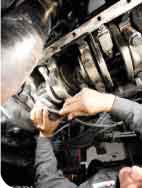 In any lemon law claim, it’s important to provide adequate proof that service attempts were made.
In any lemon law claim, it’s important to provide adequate proof that service attempts were made.The Wisconsin Department of Transportation offers these tips on effective record-keeping for owners who might end up with a lemon law claim:
Get a repair order for every repair visit, even if the shop doesn’t diagnose the problem or attempt a repair.
Make certain any repair order shows the problem you report, and the dates the truck is in the shop.
Keep all purchase contracts, warranties and repair orders.
Tips for quality warranty service
Most owner-operators lack the recourse of a lemon law for repeated problems. A good dealer, though, is motivated to work with you on warranty repairs because the manufacturer pays the dealer for doing the work.
ATBS maintenance adviser Bill McClusky offers these tips toward obtaining effective service:
Communicate what is happening in as much detail as possible.
If diagnosis is proving difficult, don’t be afraid to suggest a tech ride with you to try and reproduce the conditions.
If the maintenance issue is sporadic or happens only under certain conditions, find out if the shop can reproduce those conditions or if you need to assist. For example, if the problems appear only under a heavy load, try to take the truck in while loaded. If your problem arises only when pulling a full load up a hill, a shop with a dynamometer can simulate that.
In cases where you’re not loaded, notes Mack Trucks spokesman John Walsh, provide your truck’s normal operating weight and details about your application.
